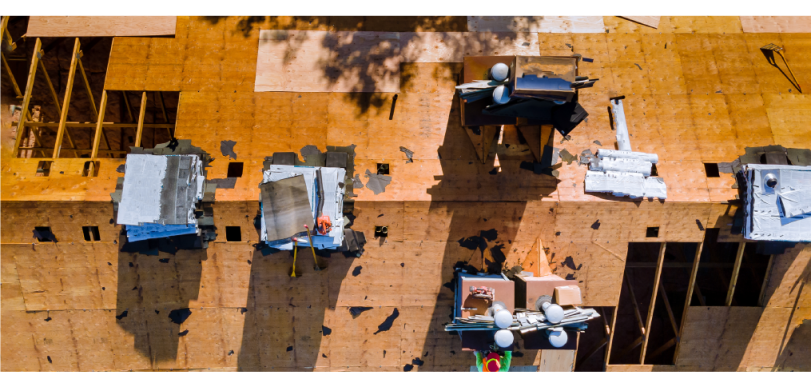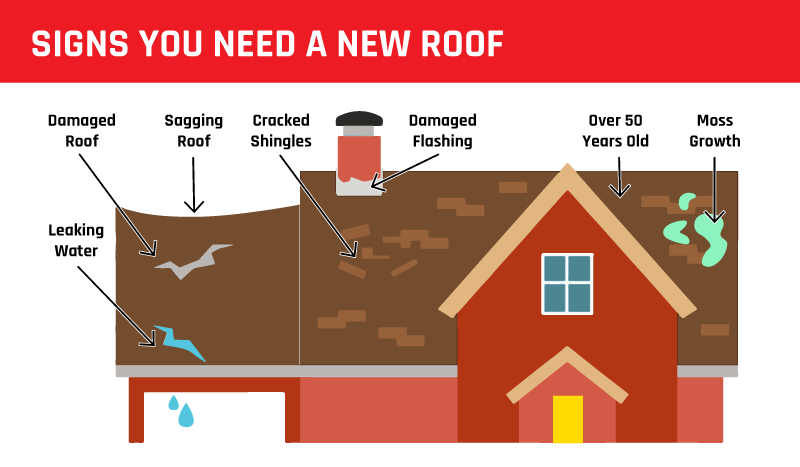When planning a roof replacement, understanding the costs involved is crucial for effective budgeting and making informed decisions. The cost of a new roof can vary significantly based on factors such as the size of your roof, the materials you choose, and the complexity of the installation. In this post, we’ll break down the typical costs of a new roof, explore the factors that influence these costs, and provide tips on how to budget effectively for your roofing project.
Typical Costs of a New Roof
In the U.S., the cost of a new roof generally ranges between $5,800 and $25,000. This wide range reflects the various factors that can impact the final price. For example, a standard asphalt shingle roof, which is the most common type for residential homes, typically costs between $5,994 and $9,791. However, if you opt for more premium materials like metal, tile, or slate, the price can increase significantly, with tile roofs often costing between $8,202 and $24,645.
Cost Breakdown by Roof Size
| Roof Size (In Square Feet) | Average Cost |
|---|---|
| 1,000 | $7,000 |
| 1,100 | $7,700 |
| 1,200 | $8,400 |
| 1,500 | $10,500 |
| 1,600 | $11,200 |
| 1,700 | $11,900 |
| 1,800 | $12,600 |
| 1,900 | $13,300 |
| 2,000 | $14,000 |
| 2,500 | $17,500 |
| 3,000 | $21,000 |
Cost Breakdown by Roofing Material
| Roofing Material | Price (For A 2,000-Square-Foot Home) |
|---|---|
| Asphalt shingles | $8,000 – $17,000 |
| Galvanized steel | $14,000 – $30,000 |
| Cedar shakes | $14,000 – $32,000 |
| Concrete tile | $15,000 – $40,000 |
| Aluminum | $16,000 – $34,000 |
| Slate tiles | $19,000 – $52,000 |
| Clay | $22,000 – $50,000 |
| Copper | $42,000 – $80,000 |
Factors That Impact the Cost of a New Roof
Several key factors can influence the cost of your new roof. Understanding these factors will help you better estimate your expenses and avoid any surprises:
-
Roof Size
The size of your roof is a major factor in determining the cost. If you're unfamiliar with the term, it's worth learning about what a roofing square is. Larger roofs require more materials and labor, leading to higher costs. The cost per square foot can range from $4.35 to $11, meaning a 1,000-square-foot roof might start at $4,350, while a 3,000-square-foot roof could cost $13,050 or more (homesandgardens.com).
-
Material Choice
The type of material you choose for your roof plays a significant role in the overall cost. Asphalt shingles are generally the most affordable option, while materials like metal, slate, and tile are more expensive. For example, asphalt shingles might cost around $150 to $300 per square foot, whereas high-end materials like slate could cost up to $1,500 per square foot (homesandgardens.com).
If you’re considering different materials, you can learn more about the options available by checking out this Types of Roofing Shingles Guide on RoofScope.
-
Roof Pitch and Height
The pitch, or steepness, of your roof can also affect costs. Steeper roofs are more challenging to work on, requiring special equipment and safety measures, which can add $1,000 to $3,000 to your labor costs. Additionally, taller homes may incur extra costs due to the increased difficulty of the job (homesandgardens.com).
-
Labor Costs
Labor typically accounts for about 60% of the total roof replacement cost. This can vary depending on the complexity of the project and the local labor market (This Old House).
-
Roof Removal
If your old roof needs to be removed before installing a new one, expect to add an additional $1,000 to $1,500 to the total cost. Some contractors include this in their estimates, while others charge it separately (homesandgardens.com).
-
Permits and Regulations
Depending on where you live, you may need to obtain permits before starting your roofing project. Permit costs can range from $100 to $1,000, depending on local regulations (homesandgardens.com).
Budgeting for Your New Roof
To ensure you're fully prepared for your roofing project, it's important to plan your budget carefully. Start by getting detailed quotes from multiple contractors and ask for a breakdown of costs, including materials, labor, and any additional charges for removal, permits, or extra labor due to roof pitch or height. It’s also a good idea to set aside a contingency fund for any unexpected expenses that may come up during the project.
For contractors looking to streamline their roofing estimates, RoofScope ProDocs offers a solution that allows you to generate instant estimates from your takeoff reports. This can save time and help ensure accurate pricing for every project.
Additional Resources
If you're considering a roof replacement, understanding the various parts of the roof and how they contribute to the overall project can be beneficial. Check out this Parts of the Roof Guide to learn more. Additionally, using tools like RoofScope, a roofing measurement software powered by Scope Technologies, can help you get precise measurements and streamline the entire roofing process.
Conclusion
Replacing your roof is a significant investment, but by understanding the typical costs and the factors that influence these costs, you can make informed decisions and budget effectively. Whether you're opting for standard asphalt shingles or considering a more premium material, knowing what to expect will help you navigate the process with confidence.
For more information on roofing projects and to get precise measurements, visit RoofScope and take advantage of their comprehensive tools and resources to make your roofing project a success.
written by RoofScope published on 08. 22. 2024


